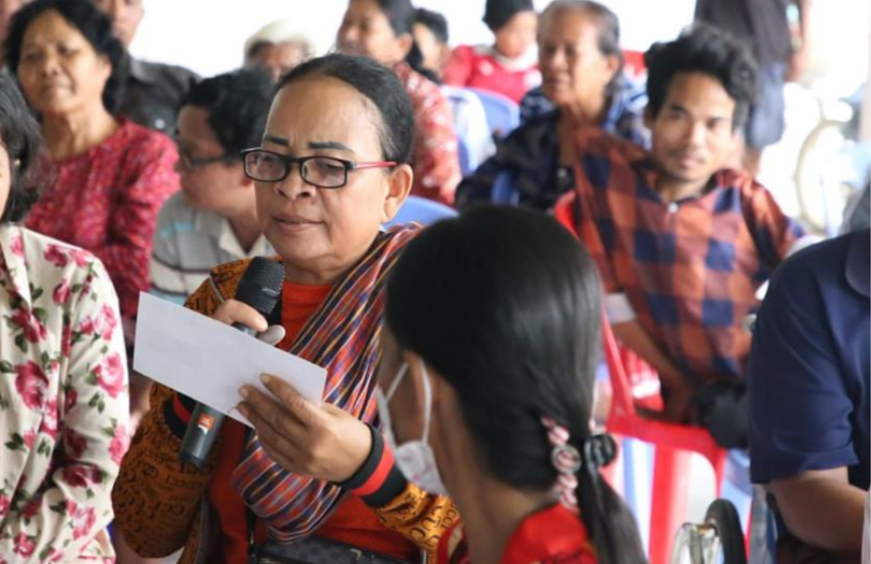The Capital City of Phnom Penh, including the Khan Sen Sok district, experiences rapid and uncoordinated urbanization, leading to challenges like limited job opportunities, large-scale migration from the countryside due to low incomes, and strains on basic social services. Issues such as inadequate housing, sanitation, public transport, and safety concerns are prevalent. While the official 2015 poverty rate for Phnom Penh was stated as 1.08%, with Khan Sen Sok at 0.83%, the urban poor, estimated at around 9.5% by the ID Poor assessment, face fluctuating incomes and poor living conditions, concentrated in peripheral areas. Khan Sen Sok is a residential area for many disadvantaged groups including migrant workers, indigenous people, people with disabilities, and LGBTQI+ individuals, who often work in the informal sector and face employment insecurity. Furthermore, there are limited capacities among Civil Society Organizations (CSOs) and disadvantaged citizens to engage in local development and service monitoring. Groups like women and youth have limited social protection and awareness of their rights. Implementing the I-SAF in Khan Sen Sok faces challenges due to a lack of prior collaboration on social accountability and citizen participation among stakeholders.
The Project “Citizen Engagement for Social Accountability in Social Protection” (2019-2024), funded by VOICE (199,788 EUR) and Oxfam (240,166.27 USD) focused on supporting disadvantaged citizens in 7 target areas: 6 Sangkhat (Phnom Penh Thmey, Ou Baek K’ am, Krang Thnong, Teuk Thla, Kork Khleang and Khmuonh) and 1 Khan Sen Sok, in Phnom Penh. Watch more videos of our projects here.
Vulnerable groups’ service feedback and voices on social protection service delivery and needs were heard and responded to, through a Social Protection I-SAF/social accountability mechanism in Khan Sen Sok (Phnom Penh).
Project beneficiaries: poor families, people with disabilities (PwD), and people of old age who received ID poor cards, family risk cards, scholarships for primary schools, monthly food aid, and PwD ID cards from service providers.
The API-ISAF intervention provided extensive support to vulnerable groups in Khan Sen Sok, addressing their immediate and long-term needs. Seven hundred and fourteen poor families received ID Poor cards, and 1,060 received Family Risk cards, enabling them to access government assistance programs and social protection schemes.
Five hundred and fifty poor students were awarded scholarships, removing financial barriers to education and helping them pursue their studies.
Four hundred and eighteen persons with disabilities were granted disability cards between 2023 and 2024, ensuring access to specific benefits and services tailored to their needs.
Eight hundred poor families consistently received monthly food aid, vital for addressing food insecurity and improving living standards.
All these targeted interventions brought stability and support to marginalized populations, directly improving their quality of life.
API provided training to Community Accountability Facilitators (CAFs) training, equipping them with the skills and tools to monitor social protection programs and advocate for vulnerable groups. API supported CAF representatives in attending monthly meetings with Commune councils, facilitating direct engagement with local authorities to address the needs and concerns of marginalized populations. Public forums were conducted to raise awareness about social protection services among vulnerable groups, enabling them to better understand and access their support.
The Benefits of reiving the ID Poor Card

Ms. On Ly, a 65-year-old, asked a question about the ID Poor Card to the local authorities during a public forum hosted by the Advocacy and Policy Institute.
Ms. On Ly, 65 years old, lives with her husband and three children, including two children with disabilities who are still studying, in Sangkat Krang Thnong, Khan Saen Sokh, Phnom Penh. She lives in extreme poverty, does not have enough money to cover her daily expenses, and does not have enough resources to pay for medical treatment. Her house, in a state of disrepair, is often flooded during the rainy season.
Facing such difficulties, Ms. On Ly heard of the cooperation between the sub-national administration and the Advocacy and Policy Institute (API), and in particular of the project “Citizen Engagement for Social Protection Services through the Implementation of Social Accountability Framework” implemented in Khan Sen Sok. She was contacted by our Staff and invited to participate in various activities such as distributing information packages for citizens, community scoring, meetings with service providers. In Sangkat Krang Thnong these activities focused especially on vulnerable groups, which were helped to understand their rights to receive public services from the sub-national administration.
After participating in various activities of the Advocacy and Policy Institute (API), Mrs. Ly became more and more aware of her rights. When the village head went to apply for ID Poor cards, she also submitted a request to the village head to get the interview for a card and finally received one. After that, she says that she was still not sure about all the benefits of the card. She participated in a social service promotion meeting in Krang Thnong Sangkat where difficulties, problems, needs, and uncertainties when obtaining ID poor card were shared with the local authorities. The village responded by helping Mrs. Ly with information and benefits related to the card.
“Currently, my family receives a monthly budget from this ID poor card and can receive health care services free of charge”, says Ms. On Ly. “I felt happy when I received this ID poor card and wish to thank API for their support and assistance in supporting my family to receive this card which is helping us a lot.”